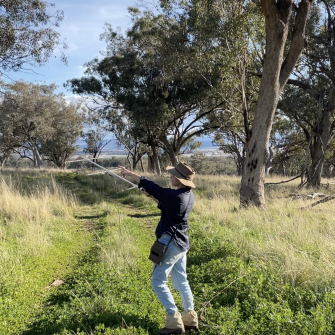Bachelor of Aviation (Management)
- Commencing Terms
- Term 1, 2 & 3
- Duration
- 3 Year(s)
- Delivery Mode
- Face-to-face (includes blended)
- Campus
-
Kensington
- Codes
- UAC code 429520
- Program code 3981
- CRICOS code 018567B
-
ATAR/2025 lowest selection rank
- 80.0 View all admission criteria
-
2026 Indicative first year full fee
- $11,000*
-
2026 Indicative full fee to complete degree
- $38,000*
-
2026 Indicative first year full fee
- $61,000*
-
2026 Indicative full fee to complete degree
- $195,000*
Application closures for 2026
International applications for all undergraduate programs, as well as postgraduate programs offered by the faculties of Arts, Design & Architecture, Engineering (excluding Master of Information Technology and associated programs) and Science are now closed to New Overseas Student Commencement (NOSC) for 2026 intakes.
Postgraduate programs offered by the Business School and the faculties of Law & Justice and Medicine & Health remain open. Master of Information Technology (and associated programs) also remain open.
- Overview
- Entry requirements
- What will I study?
- Future careers
- How to apply
- Fees & Scholarships
Overview
Join one of the world’s most critical industries and launch your career in aviation. This degree is perfect for those who want to work in aviation but not as a pilot. The aviation industry relies on a network of systems and processes to operate smoothly – flying is just one part.
The Bachelor of Aviation (Management) is ideal for those seeking to join the aviation industry and learn all things operations, safety and human factors. This three-year, full-time program with our School of Aviation, equips you with the essential skills and knowledge to make an impact from day one. You’ll unlock opportunities within international and regional airlines of all sizes, as well as airports, government agencies and air safety authorities including WSI, Toll Aviation Services and Royal Flying Doctors Service.
Throughout the course, you’ll engage in independent and team-based learning activities to solve contemporary air transport problems. From human factors and safety to finance, marketing and aviation law, you’ll graduate as a knowledgeable, confident aviation professional, ready to take on influential roles. You will also have the option to pursue an optional minor in Aviation Data Analytics, Human Factors and Aviation Safety, or Aviation Law and Sustainability.
The Concurrent Graduate Diploma in Flying (UNSW Program 5536)
Australian citizens and permanent residents, and New Zealand citizens with special Australian residency visas may concurrently study for the Graduate Diploma in Flying. This program enables you to achieve professional piloting qualifications. The concurrent Bachelor of Aviation (Management) and Graduate Diploma (Flying) programs take four years to complete.
Key features
Industry-aligned degree
Learn from leading industry experts throughout your degree, applying real-world knowledge. Our Airline and Airport Management courses are taught by Dane Kondic, CEO of EuroAtlantic Airways in Portugal. Additionally, our Aviation Security and Air Freight Logistics course is led by Trevor Jones, Head of Security for Qantas.
Practical experience
You’ll be encouraged to undertake industry-based scholarships and internships. The experiences range from operating a start-up airline in a management simulation to exploring the cognitive abilities of humans in the fast-developing aviation environment. These programs provide valuable opportunities to determine career interests and significantly enhance your employment prospects upon graduation.
Safety Standards
Safety in the aviation industry is highly respected. Alongside operations, you’ll learn how to manage safety risks, including how systems are made and adapted to the human limitations like vision, hearing, perception, memory, fatigue and distraction. Safety is a highly transferrable critical thinking skill you’ll develop throughout the program.
Why study at UNSW?
Join our School of Aviation
UNSW is as a global top 20 university (QS World University Rankings, 2024–2026) with a stand-alone aviation school that offers specialised aviation degrees, operates flight training under its own Air Operator’s Certificate and conducts research. You’ll gain exposure to our range of industry partnerships and connections, and you’ll benefit from the access, opportunities, and mentorship of our leading experts at the UNSW School of Aviation.
Gain insights from expert educators
Our industry facilitators bring a wealth of aviation experience, while our academic staff regularly engage with regulatory authorities, industry bodies and research collaborators. UNSW Aviation academics come directly from leadership roles in industry, having held senior management positions with Qantas, Sydney Airport, Airservices Australia, CASA, ATSB and the Federal Airports Corporation.
Gain industry-relevant knowledge and experience
This program was developed in consultation with the Australian aviation industry to produce graduates who will advance to positions of management and influence. Students will learn critical thinking and decision-making skills in topics including airline marketing, aviation safety and security, schedule planning, flight operations, airline and airport management and more.
Want to see more from UNSW Science?
Entry requirements
-
- The 2025 Lowest Selection Rank (LSR) is the adjusted rank (ATAR plus adjustment factors) you would have needed to gain entry to this degree in 2025.
- The 2025 A levels score is based on four Advanced Level (A2) subjects. Entry scores are calculated from the best three or four A2 subjects (excluding repeated subjects) using the following values: A*=6, A=5, B=4, C=3, D=2, E=1. At most one Applied A Level subject may be included in the best four subjects used to calculate the aggregate.
- The 2025 IB Diploma is an indication of the IB you would have needed to gain entry to this degree in 2025. It is to be used as a guide only.
- The 2025 Lowest ATAR is the lowest ATAR (before adjustment factors were applied) to which an offer was made. Where <5 is listed, this indicates that less than 5 ATAR-based offers were made and so the score has not been published. N/A indicates no offers were made on the basis of ATAR.
*The Lowest ATAR to which an offer was made, for this program, is based on a UNSW Gateway Early Conditional Offer.
-
At UNSW, we are committed to ensuring prospective students have all the information they need in order to make informed decisions about their study options.
To assist you in gaining a better understanding of how Admissions works at UNSW, we have provided you with a summary of ATAR offers and the student profile.
We hope this information will help you identify the degree that is right for you.
Assumed knowledge
Mathematics Advanced
Adjustment Factors
We offer a range of adjustment factor schemes that reward students for academic performance and extra-curricular achievements. These schemes also take into account a range of personal and educational disadvantages that may have affected your studies.
HSC Plus
This scheme rewards students who perform well in Year 12 subjects that are relevant to their preferred UNSW degree. You may be awarded up to five points.
Elite Athletes, Performers and Leaders (EAPL)
This program recognises achievements in the areas of sport, academia, leadership and music at an elite level. You may be eligible for up to five points.
Educational Access Scheme (EAS)
Factors such as illness, financial hardship, language difficulties or attending a particular school can mean you don't always get the best possible marks in Years 11 and 12. If one of these situations applies to you, submit an application for the Educational Access Scheme (EAS) via UAC. Eligible students can receive between 1 and 10 points towards their chosen UNSW degree.
Admission pathways
Your ATAR is not the only measure of your potential to succeed, which is why we offer a range of pathways into university. Explore your options below and get in touch with our Future Student Advisers to discuss your path to UNSW.
Gateway Admission Pathway
This scheme is open to students who attend Gateway schools, live in a low-socioeconomic area based on IEO index of SEIFA criteria, are Aboriginal and/or Torres Strait Islander, or hold an eligible humanitarian or protection visa. This pathway provides early offers and early conditional offers with a reduced ATAR entry requirement for your preferred UNSW degree.
Entry programs for Australian Aboriginal and Torres Strait Islander people
We offer entry programs for Indigenous Australians, including the Indigenous Preparatory Programs and the Indigenous Admission Scheme (IAS). The entry pathway program you apply for will depend on the degree you want to study.
TAFE Pathways Programs
Students who have completed a TAFE qualification may be eligible for credit transfer. For more details, including this program's TAFE Pathway study plan, visit UNSW TAFE Pathways Program.
English language requirements
You may be asked to provide evidence of your English proficiency to study at UNSW depending on your educational background and citizenship. English language skills are vitally important for coping with lectures, tutorials, assignments and examinations - this is why UNSW requires a minimum English language competency for enrolment.
If you’re completing an Australian Year 12 qualification (e.g. NSW HSC or equivalent), you do not need to provide anything extra to prove your proficiency. Your qualification will be used as evidence of your English proficiency.
If you do need to provide evidence of your English proficiency, this will be indicated in your application. You can prove this by providing evidence that you meet one or more of the following criteria:
- English language tests and university English courses
- Prior study in the medium of English
- Other qualifications
If you need to improve your English skills before you start your degree, UNSW College’s Academic English Programs are for you. The programs are suitable for various English levels and help you prepare for university studies and life in Australia.
For more details, visit the English Language Requirements page.
International direct entry
Information for applicants with CBSE, HKDSE or Singapore A Levels Qualification
Calculating your CBSE Score:
Awarded by CBSE, average percentage marks across English or Hindi, and your best four remaining subjects. Where marks are given as a range, the mid-point for that range is used e.g. 75 to 80 = 77.5.
Calculating your HKDSE Score:
Entry requirements are based on the aggregate of the best 5 achieved category A subjects (category B and C subjects are not considered).
For subjects other than Citizenship and Social Development: level 5**=7 points, level 5*=6 points, level 5=5 points, level 4=4 points, level 3=3 points, level 2=2 points, level 1=1 point, Level U=0 point.
For subject Citizenship and Social Development: Attained=2 points, Unattained=0 point. Citizenship and Social Development will only be counted towards the aggregate if the 2 points awarded for Attained ranks among the student’s best five scoring subjects.
If Mathematics Compulsory Part and Extended Part (Module 1 or 2) are both presented, both scores can be counted.
Calculating your Singapore A Levels:
Due to significant changes to the GCE A-Level Curriculum and University Admissions Score (UAS) calculation effective 2026, UNSW assessment is currently under review.
Note: Entry requirements published on this page are correct as of the day of publication and may change without notice.
We do not accept secondary qualifications from this country. We may accept tertiary study results, please contact us for more information.
Please contact us for direct entry requirements.
Admission pathways
If you do not meet the requirements for direct entry into your chosen degree, you may be eligible for a pathway program with UNSW College. UNSW College provides alternative entry options using university-approved content so that you can start your UNSW journey with confidence.
English language requirements
You may be asked to provide evidence of your English proficiency to study at UNSW depending on whether you are from an English-speaking background or non-English speaking background. English language skills are vitally important for coping with lectures, tutorials, assignments and examinations - this is why UNSW requires a minimum English language competency for enrolment.
If English is not your first language, you’ll need to provide proof of your English proficiency before you can be given an offer to study at UNSW. You can do this by providing evidence that you meet one or more of the following criteria:
- English language tests and university English courses
- Prior study in the medium of English
- Other qualifications
If you need to improve your English skills before you start your degree, UNSW College’s Academic English Programs are for you. The programs are suitable for various English levels and help you prepare for university studies and life in Australia.
For more details, visit the English Language Requirements page.
Check the specific English language requirements for this program
What will I study?
UNSW is introducing a new academic calendar from 2028.
We are moving to a new flex-semester calendar. What does this mean for your studies?
Program structure
The program aims to develop your critical thinking and decision-making skills across the following areas:
Airline marketing
Aviation safety
Aviation security
Corporate planning
Flight operations
Airline management
- Airport management
You’ll gain practical and team-building skills through exposure to current aviation topics and by solving contemporary air transport problems.
To see the full list of electives on offer, please visit the UNSW Handbook
Full program structure
Students must complete 144 units of credit (UOC) to graduate with a Bachelor of Aviation (Management). This three-year full-time course includes core courses (78 UOC), prescribed electives (18 UOC), free electives (36 UOC), general education courses (12 UOC) and an optional minor (24 UOC).
Core courses
-
- Aeronautical Knowledge for Aviation Managers (6 UOC)
- Introduction to Human Factors: The Safety Science of Human Performance (6 UOC)
- Aviation Transport Economics (6 UOC)
- Improving Communication Skills for STEMM (6 UOC)
- Mathematics for Life Sciences (6 UOC)
- Statistics for Life and Social Sciences (6 UOC)
-
- Airline Financial Analysis and Decision Support (6 UOC)
- Aviation Law and Regulations (6 UOC)
- Airport Management (6 UOC)
-
- Airline Management (6 UOC)
- Airline Resource Management (6 UOC)
- Aviation Safety and Resource Management (6 UOC)
- Aviation Research Methods (6 UOC)
Prescribed electives
-
Students must take one of the following courses:
- Advanced Human Factors (6 UOC)
- Airline Marketing Strategies (6 UOC)
- Aviation Operations Research (6 UOC)
- Quantitative and Qualitative Research Methods in Aviation (6 UOC)
- Aviation Security and Air Freight Logistics (6 UOC)
- Air Transport: Economics and the Environment (6 UOC)
- Managing People (6 UOC)
- Drones and Society (6 UOC)
- Drone Operations and Management (6 UOC)
-
Students must take two of the following courses:
- Human Factors Tools and Methods (6 UOC)
- Aviation Safety Management Systems (6 UOC)
- Workplace Safety (6 UOC)
- Aviation Work Placement (6 UOC)
- Advanced Law and Regulation in Aviation (6 UOC)
- Flight Data Analytics (6 UOC)
- Aviation Data Modelling (6 UOC)
- Managing Safety and Risk at Work (6 UOC)
- Science Industry Project (6 UOC)
- Sustainable aviation and tourism (6 UOC)
-
Students must take 36 UOC of any academic course offered by the university.
-
Students must take 12 UOC of any course outside the Faculty of Science.
-
Students may choose to take one of the following minors:
- Aviation Data Analytics (24 UOC)
- Aviation Law and Sustainability (24 UOC)
- Human Factors and Aviation Safety (24 UOC)
- Drone Applications Minor (24 UOC)
Future careers
Australia has one of the most highly developed aviation industries in the world. It’s home to some of the best global airlines and has significant hubs for airlines based in Asia, the Americas and Europe.
Our graduates work across a range of Australian and international organisations including Qantas, Airservices Australia, Rex, the Defence Forces, Sydney Airport, the Civil Aviation Safety Authority, Virgin Australia, Singapore Airlines, Cathay Pacific, Qatar Airways and Emirates, to name a few.
Potential careers
Airport operations manager
Flight operations management
Ground operations management
Freight operations management
Aerodrome reporting officer
Logistics
Network planning, scheduling, and slots
Airport management
Government relations management
Customer service management
Revenue management
Brand marketing management
Finance strategy and commercial planning
Property management
Human resources and workforce planning
Customer experience professional
Incident investigator
Work safety officer
Aviation safety and human factors
Airworthiness management
Environment and quality assurance
Legal and compliance
Digital IT and aviation analytics
Human factors specialists in other transport industries such as rail and road (Transport for NSW)
Our alumni
“I really appreciated the industry expertise provided through guest speakers. Guest speakers turned theory into practical examples - I was able to use this knowledge in job searches and in my work. We were always given current topics to tackle.”
Cathy Ma
Program Manager Cabin Crew, Qantas
“The UNSW Aviation community is the best part of the course. I felt like my voice as a student was always heard through AvSoc (Aviation Student Society), and the students and the school have a really close connection. The teaching staff were always there to not only challenge you but as a student I felt valued. The course helped me broaden my idea of the aviation industry from being more than just airlines. It added another level of knowledge, understanding the different facets of the industry from aviation regulators to airports and maintenance.”
Robyn Thomson
Airport Planner, Sydney Airport
How to apply
Applications for undergraduate study from domestic students (Australian citizens, Australian permanent residents, Australian permanent humanitarian visa holders and New Zealand citizens) are processed by the Universities Admissions Centre (UAC).
Visit the Apply section of the UAC website and you can nominate up to five degrees in order of preference, with the first being your most desired degree and university.
On-time applications for admission usually close at the end of September each year for Term 1 admission. Late applications can be submitted, but a late fee will apply. For study starting in Term 1, the majority of offers are made in December and January. Visit the UAC website for key dates for admission outside of Term 1.
The Concurrent Graduate Diploma in Flying (UNSW Program 5536)
Australian citizens and permanent residents, and New Zealand citizens with special Australian residency visas may concurrently study for the Graduate Diploma in Flying. This will enable them to also achieve professional flying qualifications. The concurrent BAv (Management) – Grad Dip (Flying) programs take four years to complete. Read more about the Graduate Diploma in Flying.
Ready to start your application?
For most international students, applications are submitted via our Apply Online service. We encourage you to submit your completed application as early as possible to ensure it will be processed in time for your preferred term.
Some high-demand programs with limited places, may have an earlier application deadline or may have an earlier commencement date. For details, visit the international admissions information page.
*If you are an international student studying an Australian qualification, go to the Universities Admission Centre (UAC) for application and UAC key dates. Note: If you are under 18 years of age, you need to make special arrangements. For details, visit the under 18 international students page.
Ready to start your application?
Fees & Scholarships
Commonwealth Supported Place: Student Contribution Band 2
*The student contribution for a Commonwealth Supported Place is an indication only of the amount payable in Year 1 based on a standard full-time load of 48 credit points (1.0 EFTSL). The actual student contribution you will be liable for depends on your individual program of study and the calendar year in which you enrol. Actual fees are calculated upon enrolment. Student contribution amounts are subject to annual review by the university and may increase each year during your studies (subject to caps determined by the Australian Government), effective at the start of each calendar year.
The indicative fees listed here are based on an estimated average and are for tuition only - other fees and charges are not included.
*Fees are subject to annual review by the University and may increase annually, with the new fees effective from the start of each calendar year. The indicative fees listed here are based on an estimated average and are for tuition only, other fees and charges are not included. The amount you pay will vary depending on the calendar year to enrol, the courses you select and whether your study load is more or less than 1 Equivalent Full Time Student Load (8 courses per year).
Indicative fees are a guide for comparison only based on current conditions and available data. You should not rely on indicative fees. More information on fees can be found at the UNSW fees website.
Indicative fees to complete the program have been calculated based on a percentage increase for every year of the program. Fee increases are assessed annually and may exceed the indicative figures listed here.
Indicative fees to complete the program include tuition plus an estimate of study-related costs of approximately $1,000 per year. To find out more about other costs, visit UNSW International.
Scholarships
At UNSW, we award over $83 million in scholarships each year. We pride ourselves on rewarding excellence and making university accessible to students from all walks of life. Whether you’re a domestic or international student, our range of scholarships, prizes and awards can support your journey.
Featured scholarships
- SYD100 Scholarship
The Sydney Airport SYD100 Scholarship has been established to support educationally disadvantaged students undertaking study with UNSW Aviation. This scholarship covers full tuition fees for four years and $25,000 towards residential fees (where relevant).
Featured scholarships
- SYD100 Scholarship
The Sydney Airport SYD100 Scholarship has been established to support educationally disadvantaged students undertaking study with UNSW Aviation. This scholarship covers full tuition fees for four years and $25,000 towards residential fees (where relevant).
Progress starts here – at a world-leading university

Top 20 Worldwide
UNSW is ranked #20 university in the world
QS World University Rankings, 2024–2026

Most Employable Graduates
Winner of the AFR Most Employable University Award seven years in a row
AFR Top100 Future Leaders Awards, 2020–2026

Australia's #1 for Innovation
Highest number of startups and spinouts from university-developed tech
SCOPR report, 2024





